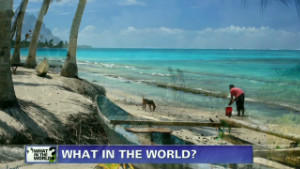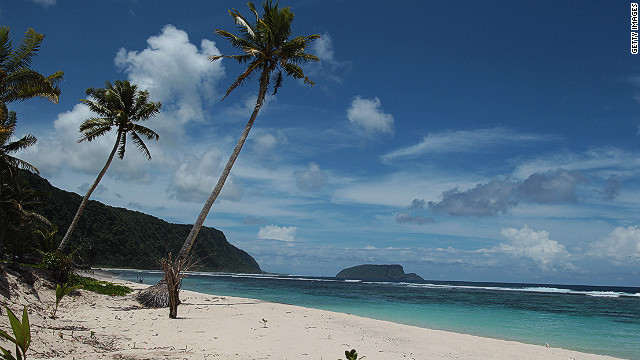Mungkin hanya segelintir pembaca masih ingat sewaktu Tun Dr Mahathir baru mengambil alih kuasa sebagai Perdana Menteri. Ramai yang bising jugak bila mantan PM mengumumkan Semenanjung Malaysia akan beralih masa untuk bersama dengan masa Sabah dan Sarawak,demi perpaduan dan juga ekonomi.
Sebenarnya, bukan itu sahaja sebabnya, zon waktu Malaysia adalah satu zon yang didiami oleh penduduk yang paling ramai di dunia, dimana zon ini juga adalah juga zon waktu Beijing dan sesetengah kawasan di Australia.
Oleh kerana ini adalah satu langkah yang bijak, LKY, PM singapura ketika itu, pun tidak dapat menolak dan terpaksa akur kerana pengumuman itu adalah satu langkah yang dianggap bijak ketika itu.
Yang akan menjadi satu debat yang hangat bagi ulamak-ulamak ialah apakah hukum solat jumaat sekiranya minggu itu tidak ada hari Jumaat, sebagaimana yang akan berlaku di Samoa minggu ini?
Sesiapa yang sudi menjawab sila komen di ruang komentar dibawah posting ini.
When the Vatican switched from the Julian to the Gregorian calendar in the 16th century, legend has it that riots broke out over the "lost 11 days" the shift caused.
However, on the Pacific island of Samoa - which plans to skip Friday this week when it switches to the west side of the international dateline -- the mood is more typically laid back and Polynesian.
"Sure, people are excited," government spokesman Uale Papalii was reported as saying to foreign media. "I myself am relaxed, (we are) only changing the calendar."
The decision to push the international dateline further to the east and go back to the future -- going directly from Thursday to Saturday -- was prompted by new economic realities rather than a need to be the first place in the world to celebrate New Year's Day in 2012.
Samoan prime minister, Tuilaepa Sa'ilele Malielegaoi, said the move would put the Pacific island nation of some 180,000 people on the same footing as its key trading partners in New Zealand and Australia, taking advantage of those economies links to China and the Pacific Rim.
"In doing business with New Zealand and Australia we're losing out on two working days a week," he was quoted as saying in the English-language Samoa Observer. "While its Friday here, it's Saturday in New Zealand and when we're at church Sunday, they're already conducting business in Sydney and Brisbane."
Currently, the archipelago is 21 hours behind Australia and 23 behind New Zealand, giving it just four working days a week that coincide with some of the Pacific Rim's largest economies. By moving the zig-zagging international dateline further to the east, Samoa will be just three hours ahead of eastern Australia and one hour ahead of New Zealand.
The international dateline -- which follows roughly 180 degrees longitude but takes diversions around islands and territories to prevent it dissecting nations internally - already creates serious anomalies for Samoa.
 Island nation skips Dec. 30thIts closest neighbor Tonga, little more than 800km to the south, is exactly 24 hours behind the island nation.
Island nation skips Dec. 30thIts closest neighbor Tonga, little more than 800km to the south, is exactly 24 hours behind the island nation.
The move, however, has raised alarm in the tourism sector which markets Samoa as the last place on earth to see the sun set and has run into opposition.
"It's a crazy idea. I see no reasoning behind a time change," Samoan resident Valentina Tufuga told the Samoa Observer. "For years we have been trading well with Australia and New Zealand despite the time difference. I think it will just be a major loss to the tourism sector who can no longer boast that Samoa is the last country in the world to see the sun."
While the switch means Samoa gains a new status as the first place on the planet to see the dawn, the tourist industry has judged this to be a less romantic and lucrative option for beachside honeymooners.
Tuilaepa has countered the tourist industry could easily set up a new draw card by marketing itself as destination where tourists can celebrate birthdays and anniversaries twice -- American Samoa, just an hour away by plane, will remain on the other side of the international dateline.
It's not the first time Samoa has crossed the international dateline.
In 1892, the then king of Samoa was persuaded to cross the line to fall into step with American ships sailing westward to San Francisco.
That shift, which gave the Samoan calendar an extra day that had to be absorbed with two consecutive July the Fourths, is now coming back in the form of this week's missing Friday; a situation that local media has mockingly referred to as TGIF or Thank God It's Friday.
Tuilaepa, whose Human Rights Protection Party has ruled Samoa since 1979, is no stranger to controversy.
Two years ago the government switched to driving on the left so that expat Samoans in Australia and New Zealand could send used cars home to their relatives.
Samoa had been driving on the right side of the road since 1900, when it was a German colony, and the change drew an outcry from motorists who defaced signs advising people to "keep left" and denounced the decision as a major hazard on the island's already dangerous roads.
Bus companies, in particular, strongly opposed the move and called on the government to compensate them for the cost refitting their passenger doors on the left hand side.
Source: cnn
Sebenarnya, bukan itu sahaja sebabnya, zon waktu Malaysia adalah satu zon yang didiami oleh penduduk yang paling ramai di dunia, dimana zon ini juga adalah juga zon waktu Beijing dan sesetengah kawasan di Australia.
Oleh kerana ini adalah satu langkah yang bijak, LKY, PM singapura ketika itu, pun tidak dapat menolak dan terpaksa akur kerana pengumuman itu adalah satu langkah yang dianggap bijak ketika itu.
Yang akan menjadi satu debat yang hangat bagi ulamak-ulamak ialah apakah hukum solat jumaat sekiranya minggu itu tidak ada hari Jumaat, sebagaimana yang akan berlaku di Samoa minggu ini?
Sesiapa yang sudi menjawab sila komen di ruang komentar dibawah posting ini.
When the Vatican switched from the Julian to the Gregorian calendar in the 16th century, legend has it that riots broke out over the "lost 11 days" the shift caused.
However, on the Pacific island of Samoa - which plans to skip Friday this week when it switches to the west side of the international dateline -- the mood is more typically laid back and Polynesian.
"Sure, people are excited," government spokesman Uale Papalii was reported as saying to foreign media. "I myself am relaxed, (we are) only changing the calendar."
The decision to push the international dateline further to the east and go back to the future -- going directly from Thursday to Saturday -- was prompted by new economic realities rather than a need to be the first place in the world to celebrate New Year's Day in 2012.
Samoan prime minister, Tuilaepa Sa'ilele Malielegaoi, said the move would put the Pacific island nation of some 180,000 people on the same footing as its key trading partners in New Zealand and Australia, taking advantage of those economies links to China and the Pacific Rim.
In doing business with New Zealand and Australia we're losing out on two working days a week
Prime Minister Tuilaepa Sa'ilele Malielegaoi
Prime Minister Tuilaepa Sa'ilele Malielegaoi
Currently, the archipelago is 21 hours behind Australia and 23 behind New Zealand, giving it just four working days a week that coincide with some of the Pacific Rim's largest economies. By moving the zig-zagging international dateline further to the east, Samoa will be just three hours ahead of eastern Australia and one hour ahead of New Zealand.
The international dateline -- which follows roughly 180 degrees longitude but takes diversions around islands and territories to prevent it dissecting nations internally - already creates serious anomalies for Samoa.
 Island nation skips Dec. 30th
Island nation skips Dec. 30thThe move, however, has raised alarm in the tourism sector which markets Samoa as the last place on earth to see the sun set and has run into opposition.
"It's a crazy idea. I see no reasoning behind a time change," Samoan resident Valentina Tufuga told the Samoa Observer. "For years we have been trading well with Australia and New Zealand despite the time difference. I think it will just be a major loss to the tourism sector who can no longer boast that Samoa is the last country in the world to see the sun."
While the switch means Samoa gains a new status as the first place on the planet to see the dawn, the tourist industry has judged this to be a less romantic and lucrative option for beachside honeymooners.
Tuilaepa has countered the tourist industry could easily set up a new draw card by marketing itself as destination where tourists can celebrate birthdays and anniversaries twice -- American Samoa, just an hour away by plane, will remain on the other side of the international dateline.
It's not the first time Samoa has crossed the international dateline.
In 1892, the then king of Samoa was persuaded to cross the line to fall into step with American ships sailing westward to San Francisco.
That shift, which gave the Samoan calendar an extra day that had to be absorbed with two consecutive July the Fourths, is now coming back in the form of this week's missing Friday; a situation that local media has mockingly referred to as TGIF or Thank God It's Friday.
Tuilaepa, whose Human Rights Protection Party has ruled Samoa since 1979, is no stranger to controversy.
Two years ago the government switched to driving on the left so that expat Samoans in Australia and New Zealand could send used cars home to their relatives.
Samoa had been driving on the right side of the road since 1900, when it was a German colony, and the change drew an outcry from motorists who defaced signs advising people to "keep left" and denounced the decision as a major hazard on the island's already dangerous roads.
Bus companies, in particular, strongly opposed the move and called on the government to compensate them for the cost refitting their passenger doors on the left hand side.
Source: cnn



No comments:
Post a Comment